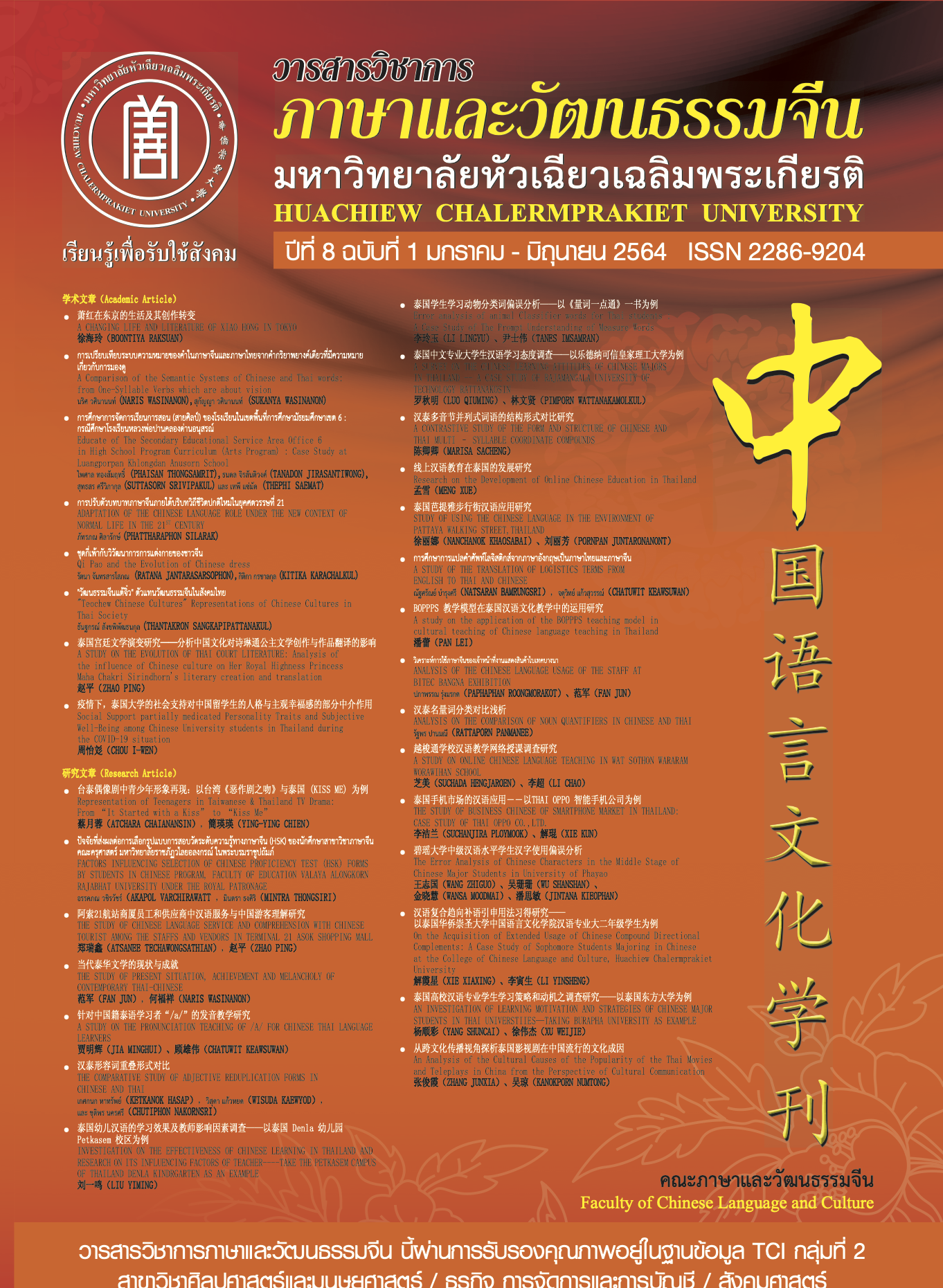An Analysis of the Cultural Causes of the Popularity of the Thai Films and TV Dramas in China from the Perspective of Cultural Communication
Keywords:
Thai Movies and Teleplays, Cross culture, communication, Culture backgroundsAbstract
Since the beginning of the 21st century, Thai films and TV dramas have begun to emerge in the international market and have been up-and-coming in China, and they have been introduced to Chinese audiences one after another.Thai TV dramas, movies and even commercials have begun to be broadcast on Chinese TV stations and the Internet. Perspectives from ordinary populist narrative, creativity centered on ordinary and simple love, content on nationalized communication, and international shooting techniques have caught the attention of Chinese audiences and quickly won lots of audiences in China. Thai film and TV dramas convey their unique national culture, food culture, class culture, religious culture and humanity culture to international audiences from the perspective of cross-cultural communication.
References
罗瑶.泰国电影在中国市场营销策略问题分析及对策建议.[J].科技经济导刊,2020,28(07)
崔颖,倪崑皓. 从“黄金时代”到“世纪危机”:20世纪下半叶泰国电影的发展历程.[J].未来传播,2020,27(01)
肖志平 . 探讨泰国电影﹤热带疾病>的编剧策略.[J].文教资料,2019,(36):199-200+154
秦仕宇 .探讨泰国电影的文化特征-以《天才枪手》 为例.[J]. 科技资训,2019,17(32):225-226
赵春灿.乌托邦之症:泰式“小清新”电影的成长策略.[J].视听,2019,(11):80-81
史可扬、康思齐. 21世纪以来泰国电影的类型融合叙事策略.[J].当代电影,2019,(11): 76-79
陈红宇 .泰国电影文化在中国的传播分析.[J].成都大学学报,2019,(05):86-91
赵彤.论泰国青春片中的泰国精神.[D].辽宁: 辽宁师范大学戏剧电影与电视艺术
田霖.泰国电影中消费主义观念与传统生活方式的对抗.[J].亚非研,2018,(01) :249-262
李敏.泰国电影跨文化传播分析.[J].国际传播,2018,(04):79-85
[泰]SUPITCHA TAVEETANAVIRIYA.泰国“后现代”电影﹤鬼妻的丈夫﹥.[J].世界文化,2018,(07):25-27
崔颖、 朱丹华.新世纪泰国恐怖电影的女性关照和喜剧倾向研究.[J].浙江传媒学院学报,2018,(03):59-63+142
[泰]Kaninsij Kingputtapong.泰国灵异电影的艺术特点及发展趋势研究.[D].浙江:浙江大学戏剧与人文科学
张晓艳,治金鑫.由泰国电影<天才枪手>透视网络语境中校园题材电影的元融合.[J].电影评介,2018,(20):52-55
段召阳.泰国影视热趋势对中国赴泰出境旅游的影响.[J].中国传媒科技,2011,(12) :108-110
Downloads
Published
How to Cite
Issue
Section
License
บทความที่ได้รับการตีพิมพ์เป็นลิขสิทธิ์ของวารสารภาษาและวัฒนธรรมจีน มหาวิทยาลัยหัวเฉียวเฉลิมพระเกียรติ
บทความใน “วารสารวิชาการภาษาและวัฒนธรรมจีน” เป็นทรรศนะของผู้เขียนโดยเฉพาะ กองบรรณาธิการไม่มีส่วนในความคิดเห็นในข้อเขียนเหล่านั้น




